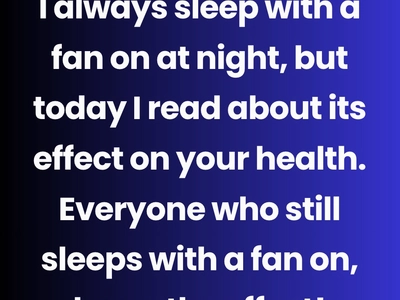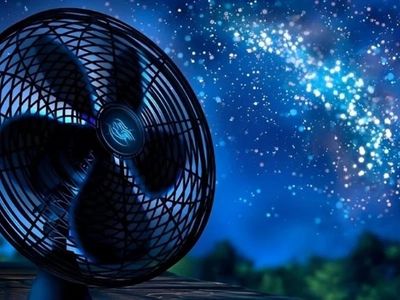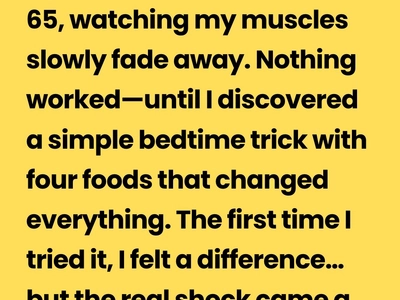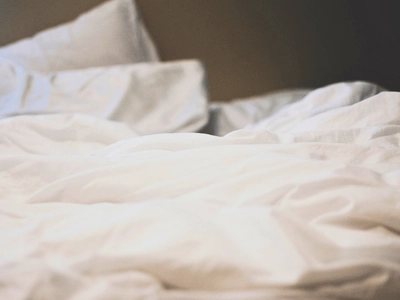Sleeping with a Fan Blowing Directly on Your Face: A Hidden Danger for Older Adults
Many older people enjoy sleeping with a fan on, especially when the nights are hot and humid. A fan brings a cool breeze, creates a calming background sound, and helps with comfort. But while a fan can be refreshing, it can also bring problems — particularly for seniors.
When we age, our bodies become more sensitive. What feels harmless to a younger person can have a stronger effect on someone in their 60s, 70s, or 80s. Things like dry skin, sore muscles, or changes in sleep quality may not seem serious at first, but over time, they can lower comfort and health. That’s why it is important to understand the possible downsides of sleeping with a fan pointed directly at the face or body.
This article will explain the risks in detail, offer practical advice for safer fan use, and share extra tips for keeping cool at night without harming health.
1. Dryness and Irritation
One of the biggest problems caused by fans is dry air. When a fan blows directly on the face, it speeds up evaporation from the skin, eyes, and even the inside of the nose and throat. For seniors, this dryness can be uncomfortable and even painful.
- Dry eyes: Many older adults already experience lower tear production due to age. A fan can make eyes itchy, red, or watery. In some cases, it can even lead to eye infections because the natural protective layer of moisture is reduced.
- Dry throat and nose: Airflow can strip away the thin layer of mucus that protects the nasal passages and throat. This can cause a sore throat, nosebleeds, or a tickling cough. For people who already suffer from allergies or sinus problems, the irritation may become worse.
- Dry skin: As we age, our skin produces less oil and becomes thinner. Constant airflow at night makes the skin even drier, which can lead to itchiness, flaking, or cracks. In some cases, it can worsen conditions like eczema.
It’s worth noting that dry air also makes the body more vulnerable to viruses. When the mucous membranes in the nose and throat dry out, germs have an easier time entering the body. That means seniors may be more likely to catch colds or other infections if they sleep with strong airflow on their face every night.
2. Stiff Muscles and Neck Pain
Fans don’t only affect the skin and airways — they can also affect muscles. Imagine lying in bed while cool air blows on the same spot for hours. The muscles in that area may tighten up.
For younger people, this may just cause mild stiffness. But for seniors, who are more prone to joint problems, arthritis, and reduced flexibility, the result can be much more uncomfortable.
- Neck stiffness: Waking up with a stiff neck is a common complaint among older adults. When a fan blows directly on the neck, the muscles can tense up and cause soreness that lasts all day.
- Shoulder or back pain: Air directed at the shoulders or back can also cause muscle tightness. For someone who already has back problems, the discomfort may increase.
- Cramps: Cool air can make muscles contract, leading to cramps in the legs or arms at night. These cramps can interrupt sleep and make it harder to get rest.
Seniors often have slower recovery times, so what feels like a minor stiffness may linger for several days. This can make daily activities — like walking, lifting, or even dressing — harder.
3. Increased Risk of Respiratory Issues
Breathing is another important area affected by fans. Cold air blowing directly onto the face while sleeping may irritate the airways and lungs. For people with existing respiratory conditions, this can become a real problem.
- Asthma: Fans can stir up dust, pollen, or pet dander in the room. For seniors with asthma, these particles can trigger nighttime attacks or make symptoms worse.
- Bronchitis: Cold air may cause the airways to tighten, making it harder to breathe. For people with chronic bronchitis, airflow can lead to coughing fits or chest discomfort.
- Weaker immunity: As the immune system ages, it becomes harder to fight off infections. Constant exposure to cold airflow may increase the risk of colds, sinus infections, or respiratory irritation.
It is also important to remember that many seniors sleep with their mouths slightly open. A fan can dry out the throat and lungs even faster in this position, leading to coughing or trouble breathing during the night.
4. Hidden Impact on Sleep Quality
Sleep is one of the most important factors for good health. Yet many older adults struggle with poor sleep, whether from medical conditions, medications, or natural changes in the body’s rhythm.
At first, a fan might seem helpful. The gentle humming sound can act as “white noise,” blocking out other disturbances like traffic or noisy neighbors. But constant airflow has hidden downsides:
- Temperature disruption: The body naturally cools down at night. If a fan blows directly on the body, it may lower the temperature too much, confusing the body’s natural rhythm. This can lead to shallow or broken sleep.
- Unnoticed awakenings: Seniors may not always wake up fully but may shift or stir many times during the night. These micro-awakenings stop the body from reaching deep, restorative sleep.
- Daytime fatigue: Poor sleep quality leads to low energy during the day, slower reaction times, and reduced mental clarity. For seniors, this can increase the risk of falls or accidents.
Good sleep is essential for memory, mood, and overall health. If a fan disrupts that cycle, the negative effects may outweigh the comfort of a cool breeze.
5. Other Concerns to Keep in Mind
Besides dryness, stiffness, and sleep issues, there are a few extra points worth noting:
- Dust circulation: Fans do not create fresh air. They move around the air that is already in the room. If the room is dusty, a fan can spread these particles around, increasing the chance of breathing them in.
- Noise: While some people enjoy white noise, others find the humming or rattling of a fan disturbing. Seniors with sensitive hearing may find it harder to fall asleep with a fan nearby.
- Circulation issues: Some seniors have poor circulation due to conditions like diabetes or vascular problems. Cold airflow on the feet or hands can make circulation worse, leading to numbness or discomfort.
- Dehydration: If the air is very dry, a fan may contribute to dehydration overnight, especially if someone does not drink enough water during the day.
Tips for Safer Use of Fans
A fan doesn’t have to be harmful if it is used wisely. Seniors can still enjoy the cooling benefits while reducing risks by following a few simple tips:
- Avoid direct airflow
Place the fan so it circulates air around the room instead of pointing directly at the face or body. - Use an oscillating fan
Fans that move side to side spread the air more evenly and prevent one area of the body from being exposed all night. - Keep a safe distance
Position the fan several feet away from the bed. This reduces the intensity of airflow. - Clean the fan regularly
Dust builds up on fan blades and grills. Cleaning prevents dust from being blown into the air. - Add moisture
If the air feels very dry, consider using a humidifier alongside the fan. This helps protect skin, eyes, and nasal passages. - Dress smartly for bed
Light pajamas made of cotton or linen keep the body cool without needing direct airflow. - Stay hydrated
Drink water during the day to avoid dryness at night. Keep a glass of water by the bed if needed.
Alternative Ways to Stay Cool at Night
For seniors who want comfort without the risks of fan airflow, there are other methods to stay cool during hot nights:
- Cooling bedding: Sheets and pillowcases made of breathable materials like cotton or bamboo help regulate body temperature.
- Light blankets: Using a thin blanket instead of a heavy comforter allows better airflow around the body.
- Room ventilation: Open windows slightly in the evening to let cooler air in, but close them if outdoor noise or allergens are a problem.
- Air conditioning: A well-maintained air conditioner set to a moderate temperature can keep the room cool without direct drafts.
- Cooling packs: Placing a cooling gel pad under the pillow or mattress can reduce heat buildup.
- Shower before bed: Taking a lukewarm shower helps lower body temperature before sleep.
Why This Matters for Seniors
For older adults, even small discomforts can have a big impact. A dry throat may lead to coughing that disturbs sleep. Stiff muscles may make it hard to get out of bed in the morning. Poor sleep may affect memory and balance.
Health in old age often depends on paying attention to details that younger people can ignore. Something as simple as the direction of a fan can mean the difference between waking up refreshed or waking up sore and tired.
Final Thoughts
Fans are not dangerous by themselves, but how they are used matters — especially for seniors. Pointing a fan directly at the face or body during sleep can cause dryness, irritation, muscle pain, breathing problems, and disrupted sleep. By adjusting the position of the fan, keeping it clean, and considering alternatives like humidifiers or cooling bedding, seniors can enjoy cooler nights without sacrificing health.
Good sleep, comfort, and safety should always come first. With the right approach, a fan can remain a helpful tool rather than a hidden source of problems.






